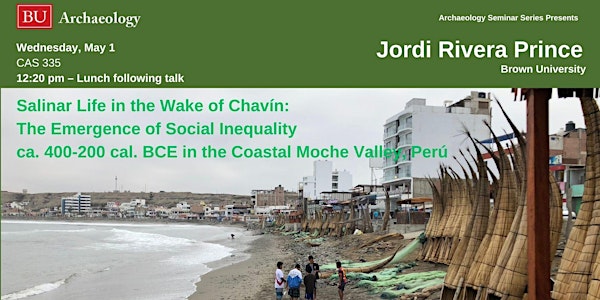
Salinar Life in the Wake of Chavín: The Emergence of Social Inequality ...
Boston University Archaeology Program Seminar Lecture Series.
Date and time
Location
Archaeology Program
675 Commonwealth Avenue 347 Boston, MA 02215About this event
- 50 minutes
During the Spring of 2024, Boston University's Archaeology Program will be hosting a series of lectures. Our last lecture of the semester is titled “Salinar Life in the Wake of Chavín: The Emergence of Social Inequality ca. 400-200 cal. BCE in the Coastal Moche Valley, Perú.” We are thrilled to have Jordi A. Rivera Prince (Brown University) joining us to share their work. The Wednesday, May 1st, 675 Commonwealth Avenue, Room 335, 12:20-1:10. Lunch provided following the talk.
In the Central Andes, the Early Horizon Chavín (800-400 cal. BCE) expressed power and ideology largely through monumental architecture of religious and political importance. Chavín had pan-Andean influence, stratified through geographically concentrated power at these monumental sites. However, ca. 500/400 cal. BCE Chavín “collapsed,” and the North Central Andes underwent a period of marked reorientation from the way of life that existed before. Changes include the abandonment of monumental centers, urbanization, settlement reorganization, population growth, changes in food patterns, increased social violence. Importantly, wealth, status, and “local elites” emerged at multiple smaller regional centers—marking the potential beginnings for social inequality and setting the foundation for subsequent polities and states (e.g., Moche and Chimú). On the North Coast, it is associated with “Salinar.”
Although most Salinar research focuses on settlement patterns and architecture analysis, little was known concerning how the emergence of inequality affected peoples’ daily lives from the perspective of human skeletons and their burial contexts. This talk will introduce the largest mortuary and bioarchaeological study of the Salinar completed to date, exploring various dimensions of lived experience and representations in death to better understand the emergence of social inequality in the movement towards stratified, institutionalized sociopolitical configurations.
Jordi A. Rivera Prince, Ph.D., RPA
Visiting Assistant Professor
Department of Anthropology
Brown University